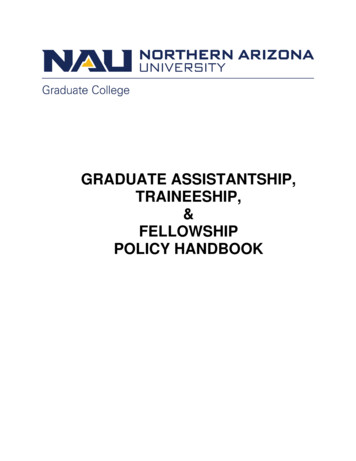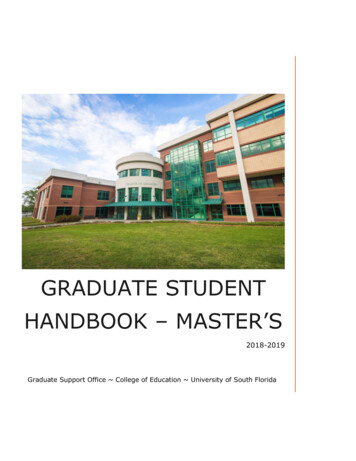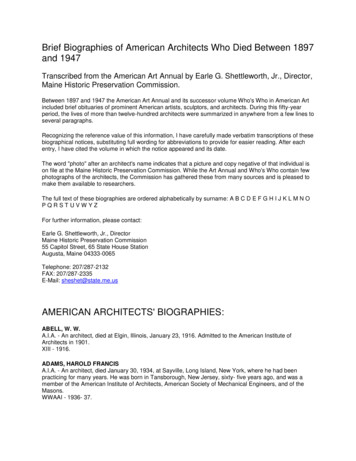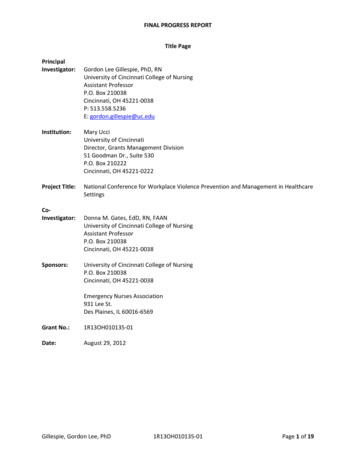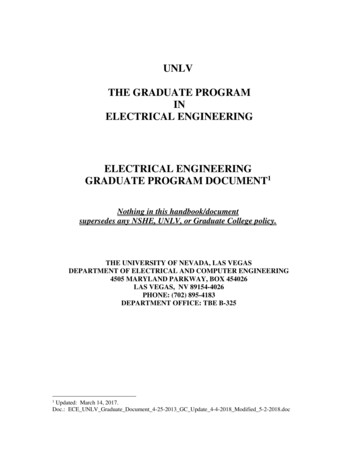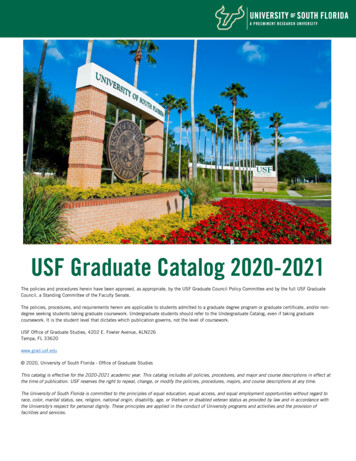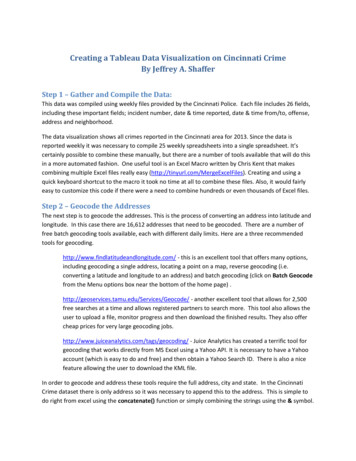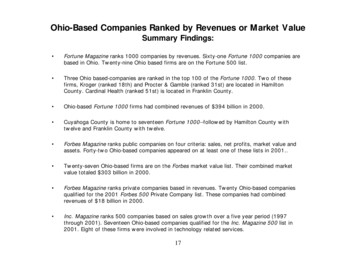
Transcription
l( fClNCIN NATIUniversity ofI COLLEGE OF NURSINGGraduate ProgramVOLUNTEER CLINICALFACULTY (PRECEPTOR)CLINICAL HANDBOOKRevised September 2021
IntroductionThe University of Cincinnati College of Nursing faculty welcomes you to the graduate program clinical experience. We are verypleased to have you with us and anticipate an extremely productive and exciting experience. Thank you for offering your time andattention to our students.This Volunteer Clinical Faculty (VCF) Clinical Handbook has been developed to help provide information about the educationalexperience. The practicum and internship courses are those in which the student will learn to integrate all the knowledge gained in thedidactic courses. When enrolled in a practicum course, the student’s UC malpractice insurance is activated and the student isresponsible for observing all the requirements in the VCF (preceptor) Clinical Handbook. It is recommended that the student becomefamiliar with the guidelines or clinical practice at each site prior to beginning clinical work at each location.During the clinical experience, the student will have a primary UC faculty member for the course in which she/he is enrolled. Facultywill be available as needed and will initiate communication with the student and preceptor. Preceptors and students may also initiatecommunication with the course faculty as necessary. If the student is having an issue that is not moving toward resolution, allparties concerned should contact the course faculty. Course faculty will consult with the program director as needed. Pleaseconsult the list below for the corresponding coordinator/director’s contact information.Adult-Gerontology Primary Care Nurse Practitioner Program Coordinator (AGPC MSN Online): Kim Mullins DNP, APRN,AOCNP: Kimberly.Mullins@uc.eduAdult-Gerontology Primary Care Nurse Practitioner Program Coordinator (AGPC MSN On-Campus, AGPC Post-Master’sCertificate On-Campus, AGPC BSN to DNP Online): Christine Colella, DNP, APRN-CNP, FAANP: Christine.Colella@uc.eduFamily Nurse Practitioner Program Coordinator (FNP MSN On-Campus, FNP Post-Master’s Certificate On-Campus andFNP BSN-DNP Online):Jeff Trees DNP, APRN, FNP-C: William.Trees@uc.eduFamily Nurse Practitioner Program Coordinator (FNP MSN Online):Jason Gregg DNP, APRN, FNP-C: Jason.Gregg@uc.edu 2021 University of CincinnatiUC Graduate ProgramPage 2 of 15
Family Nurse Practitioner Post-Master’s Program Coordinator (FNP Post-Master’s Certificate Online):Sherry Donaworth, DNP, APRN, ACNP-BC, FNP-BC: Sherry.Donaworth@uc.eduNurse-Midwifery Program Director (NMID MSN Online):Eva Fried, DNP, WHNP, CNM: friedev@ucmail.uc.eduWomen’s Health Nurse Practitioner Program Coordinator (WMSH MSN Online): Tamara Pavlik-Maus, MSN, WHNP-BC:pavlikta@ucmail.uc.eduAcute Care Pediatric Nurse Practitioner Program Coordinator (ACPNP MSN On-Campus, ACPNP Post-Master’s CertificateOn-Campus, ACPNP BSN to DNP Online): Robyn Stamm, DNP, APRN, CPNP-PC/AC: Robyn.Stamm@uc.eduAdult-Gerontology Acute Care Nurse Practitioner Program Coordinator (AGAC MSN On-Campus, AGAC Post-Master’sCertificate On-Campus, AGAC BSN to DNP On-Campus):Kathleen Ballman, DNP ACNP-BC, CEN: Kathleen.Ballman@uc.eduNeonatal Nurse Practitioner Program Director (NEON MSN On-Campus, NEON Post-Master’s Certificate On-Campus):Valerie Moniaci DNP, MSN, RN, APRN: Valerie.Moniaci@uc.eduPsychiatric Mental Health Nurse Practitioner Program Coordinator (PP Post Master’s Certificate Online and PP BSN-DNPOnline):Lee Tyson, DNP, DMin, APRN-CNP, PMHNP-BC, CARN-AP: Ronald.Tyson@uc.eduSystems Leadership Program Coordinator (formerly referred to as Nursing Administration) (NADM MSN Online and NADMBSN-DNP Online):Joan Sevy Majers, DNP, RN, FACHE, CENP, CCM: Joan.Sevymajers@uc.edu 2021 University of CincinnatiUC Graduate ProgramPage 3 of 15
Graduate ObjectivesThe graduate program objectives are listed below. By the completion of the program, the student is expected to: Integrate theoretical perspectives from nursing science and related sciences as a framework for planning holistic care toenhance, modify, or support the health patterns of client systems in various environmental contexts.Demonstrate competence in advanced nursing practice with focus on direct and indirect delivery of care and evaluation ofoutcomes for defined client systems.Demonstrate critical thinking and effective communication skills for advanced nursing practice as a part of a multidisciplinaryteam within various environmental contexts.Design programs for defined client systems in health promotion, maintenance, restoration and palliation within a framework ofpopulation-focused advanced nursing practice.Demonstrate professional roles to operationalize standards of care and to effect change in nursing practice.Critically appraise available evidence in the planning and delivery of safe and effective care.Participate in the political process to influence health and social policy.Demonstrate legal, ethical, and financial accountability from the perspective of advanced nursing practice and within variousenvironmental contexts.Exhibit a commitment to excellence in nursing practice and to advancement of the discipline of nursing through engaging inscholarly inquiry.Administrative Requirements for Volunteer Clinical FacultyA major component of the MSN, the Post-Master’s Certificate, and BSN-DNP Programs involves the preceptor who will help studentscomplete their clinical requirements. The preceptor provides training, mentorship, and supervision. To gain credit for clinicalrequirements, each student must identify a preceptor who is qualified to approve and sign off on clinical evaluations as they areperformed successfully.Acceptable preceptors, and clinical sites, cannot be perceived to have a conflict of interest as relates to evaluation of the student. Forexample, acceptable preceptor may not be related to the student, and may not work in the same department as the student (some 2021 University of CincinnatiUC Graduate ProgramPage 4 of 15
ACPNP students can do clinical in the same unit as they work). It is at the discretion of the program coordinator which practicumsites and preceptors are appropriate for clinical courses.Preceptor applications are to be submitted to the Clinical Site Coordinator three months before the start of the term.Volunteer Clinical Faculty (preceptor) applicants will be reviewed for assignment based on the fulfillment of the following mandatoryrequirements: Licensed to practice in the jurisdiction of her/his employment Master’s degree or higher Practitioner certified in her/his field of experienceo If a WHNP, certification through NCCo If a CNM, certified as a nurse-midwife by the ACNM/AMCBo If a NP, certification through ANCC, AANP or PNCB (for Pediatrics)o If a CNS, education and certification and functioning in CNS roleo In some circumstances MD / DOo Please note, physician assistants may not precept studentso PMHNP (or other professional licensed to practice psychotherapy) If a Nurse Administrator (Manager, Director, CNO, etc.), the preceptor must have a MSN, or BSN with at least a Master’s degreein another field (i.e. MBA, MHA). The expectation is that the preceptor is a least one administrative level above the student. Submission of current professional curriculum vitae Practicing at least one year in advanced practice/leadershipState Boards of NursingThe UC College of Nursing has approval to admit students from every state except for the states listed below. The UC GraduatePrograms meet requirements for licensure in all other states. It is highly recommended that applicants who reside outside of Ohiocontact the appropriate state licensing agency to seek information and guidance before beginning the program. State licensing boardcontact information can be found on the National Council of State Boards of Nursing website, and most State Boards of Nursing havea ListServ that allow students to join so that they can be informed about these compliance requirements and processes.Online Programs that originate in one state, but offer enrollments to students in another state are required to seek state approval. Eachstate has different requirements and processes which are continuously being updated and sometimes changed. 2021 University of CincinnatiUC Graduate ProgramPage 5 of 15
Please note that as a result of state boards of nursing and the DOE Higher Education regulation changes, the UC College of Nursingdoes not accept applications for our online program from students residing in the following states:MSN Programs Arizona Louisiana Massachusetts New York Oregon Rhode Island TennesseePost- Master’s Certificate Programs Arizona Louisiana Massachusetts New York Oregon Rhode Island TennesseeBSN-DNP Programs Arizona Louisiana Massachusetts New York Oregon Rhode Island Tennessee WashingtonStudents planning to participate in clinical experience in one of the states above should speak with his/her faculty advisor prior tofurther consideration. 2021 University of CincinnatiUC Graduate ProgramPage 6 of 15
Critical Requirements and Malpractice InsuranceThe UC College of Nursing can verify that all students have an active HIPPA, Blood Borne Pathogen, Basic Life Support certificationand have met the University’s Health Service requirements for health profession students in clinical settings, which include titers,immunizations, Flu and TB testing, at the beginning of the term. Students will have also successfully passed a 12 panel drug screenand criminal background check.Students will be covered under the University of Cincinnati’s comprehensive program of self-insurance and commercially purchasedinsurance. The malpractice insurance is in effect during the enrollment of a clinical course. The clinical site coordinator can provide acopy of the insurance verification, to the site (if needed).Preceptor and Student ExpectationsIt is recommended that the student and preceptor discuss the following: The student’s background and skills (developmental level), and areas the student has identified as needing special attention.Review the core competencies for their specific specialty area.The student’s learning style and ways that the student has successfully learned in the past.The preceptor’s preferred learning style which will be used in the clinical settingThe need for an orientation period for the student. The length of this orientation will vary depending on the student’sfamiliarity with the setting.Any dress requirements (students are required to wear UC picture ID at all times.)The best mechanism by which the student communicate with the preceptor if illness or emergency necessitate a missed clinicalday.The practice guidelines for their specific specialty area.The student’s clinical schedule and the needs of the site. Include a review of the appropriate didactic requirements and theconsequences if this work is not completed in a timely fashion.The length of time needed by the student to feel comfortable in the new role will vary greatly. It is up to the individual studentand preceptor to design the clinical experience that best meets their needs.Discuss how many hours/days per week needed to work with the preceptor to obtain the required clinical hours. Discussadjustments to the clinical schedule as necessary.Any special considerations in dealing with hospital, clinic personnel, or clients.Any expectations for attendance at staff meetings, case review, grand rounds or other department functions.Off-site conferences do not count towards clinical time. 2021 University of CincinnatiUC Graduate ProgramPage 7 of 15
Clinical Site AgreementAn approved agreement between the University of Cincinnati, College of Nursing and each clinical site must be in effect priorto the onset of a student’s clinical experience.UC can offer a one page Letter of Agreement or a six page Educational Affiliation Agreement (contract), depending upon theagency requirement. VCF Application Packets should indicate which type of agreement each clinical site will require. EducationalAffiliation Agreements (contracts) will be processed as soon as possible. Most health care organizations such as hospitals will require an educational affiliation agreement. The UC College of NursingGraduate Programs has a standard educational affiliation agreement approved by UC’s Office of General Council, but manysites prefer to use their own standard educational affiliation agreement.Note: The process of getting the educational affiliation agreements approved and executed can take several months so please startthe process early.Letters of Agreement will be emailed to the preceptor and Educational Affiliation Agreements will be emailed to the administrativecontacts before the start of the clinical course.Clinical Site Coordinator OfficeUC College of Nursing - Procter Hall3110 Vine StreetCincinnati, OH 45221-0038Fax: (513) 558-6417If you have questions regarding the process of clinical site approval please contact the appropriate Clinical Site Coordinator. Pleaseconsult the program codes in the introduction for the long-form title of each program. 2021 University of CincinnatiUC Graduate ProgramPage 8 of 15
Angela (Angie) Gresham (angela.gresham@uc.edu or (513) 558-0005):Adult-Gero Acute Care Nurse PractitionerAdult-Gero Primary Care Nurse PractitionerFamily Nurse Practitioner (Post-MSN Certificate Only)Neonatal Nurse PractionerMelissa Joos (melissa.joos@uc.edu or (513) 558-2969):Acute Care Pediatric Nurse PractitionerFamily Nurse Practitioner (MSN and DNP Only)Neonatal Nurse PractitionerMaureen (Mo) Koo (maureen.koo@uc.edu or (513) 558-5290)Nurse-MidwiferyPediatric Acute Care Nurse PractitionerWomen's Health Nurse PractitionerJalicia Ruttino (jalicia.ruttino@uc.edu or (513) 558-3815):Psychiatric Mental Health Nurse Practitioner Systems Leadership(formerly referred to as Nursing Administration)Clinical ExperiencesDuring the clinical component of the graduate program, the UC College of Nursing professionally insures the student for work as anadvanced practice nursing student. In order to ensure that the proper amount of risk management is met, the student may not: Complete any clinical hours with a preceptor unless the site has an affiliation agreement or letter of agreement with the Collegeof Nursing. If the student has any questions about this, please contact a Clinical Site Coordinator. Work as a practitioner in the same clinic or unit where the student is doing clinical work as a student in his/her educationprogram. Work with a preceptor with whom they are related.When working as a staff nurse, health practitioner student, or practitioner in any setting where the student is known as a student NursePractitioner/ Clinical Nurse Specialist, it is the student’s responsibility to practice within the scope of the student’s nursing license.The student must not assume any additional responsibilities based on the students enrollment in a graduate program or based on thestudent’s advanced knowledge base. 2021 University of CincinnatiUC Graduate ProgramPage 9 of 15
ANY VIOLATION OF THE ABOVE POLICIES COULD RESULT IN DISMISSAL FROM THE UC COLLEGE OFNURSING GRADUATE PROGRAM.Clinical SupervisionIt is recommended that the preceptor adjust their level of supervision to the student’s level of development. Preceptors are to providedirect supervision of students during the entire clinical experience. As the student demonstrates competency in a given area, thepreceptor does not have to be present in the room at the time of consultation but must be on site to provide supervision of the student.Clinical ResponsibilitiesIn order to maximize outcomes of the clinical practicum, students, preceptors, and course faculty have certain responsibilities thatshould be demonstrated during the clinical experience. It is through the collaboration and partnership amongst all involved thatstudent’s fine-tune their clinical skills and provide strong patient care.Responsibilities of the Student: Prepare personal learning objectives for the clinical experience that complement the course objectives. Identify these objectives with measurable outcomesGain approval of these objectives from the preceptor and the faculty. Demonstrate responsible professional behavior. Follow the dress code, policies, and procedures of the agency.Be on time for all scheduled clinical experiences.Call in a timely manner if unable to attend clinical experience.Avoid personal use of tablets or cell phones in the clinical setting, only accessing apps which may enhance the clinical learningexperience. Clinical Responsibilities: 2021 University of CincinnatiUC Graduate ProgramPage 10 of 15
Prepare for clinical experiences.Maintain confidentiality of patients.Perform appropriate assessments of clients.Interpret data obtained from labs, diagnostic tests, and monitoring devices to trend patient condition.Prepare a differential diagnosis list and present patient case to the preceptor.Develop a plan of care for the patient.Recognize emergency situations and make appropriate decisions regarding treatment with preceptor.Perform new or advanced interventions only under the direction of the preceptor and according to agency policies.Provide appropriate health teaching for patients and families specific to disease process or illness.Ensure that preceptor is informed of patient condition.Recommend appropriate referrals for specialty services.Document patient encounters according to agency policy and identify self as a RN, NP student. Have documentation cosignedby preceptor.Communicate effectively with other members of the health care team. Maintain a practicum journal which is turned in to the faculty at least three during the semester. Confer with the faculty and preceptor at least twice during the semester regarding progress toward meeting clinical and courseobjectives. Update progress toward personal learning objectives in each practicum journal using specific examples of achievement. Independently seek learning opportunities in the clinical setting.Responsibilities of the Preceptor: Communicate appropriate policies, procedures, expectations of the agency.Assist the student to obtain appropriate identification required by the agency.Prepare the agency/staff for the student’s arrival and role in the care of clients.Be present in the clinical area when students are seeing patients.Orient student to the advanced nursing practice role.Review and approve student objectives for the experience.Provide opportunities to assess patients.Review student assessments and validate findings.Cosign any documentation according to the policies of the agency.Discuss the management of the client. 2021 University of CincinnatiUC Graduate ProgramPage 11 of 15
Guide the student in the performance of any intervention. Guide the student in identifying ways to evaluate the plan of care. Assist the student in learning the referral process and the role of the APRN in the health care team. Guide the student in suggesting additional readings or other learning opportunities. Confer with the faculty and the student at least twice during the semester about student progress. Complete a midterm and final evaluation on the student. Validate student’s time logs biweekly. Notify faculty immediately of any student issues or concerns. Review and adhere to the Family Educational Rights and Privacy Act (FERPA). See Student & Patient Privacy section at thebottom of this page for more information. Review documents related to the clinical course (welcome letter, clinical hours requirement, syllabus, course objectives, etc.) andseek clarification from the respective faculty program coordinator. Discuss with student his or her experience/background.Responsibilities of the Faculty: Consider the workspace in your office and which area might best accommodate student learning.Keep in mind space in which you can freely offer feedback and address student questions that will not disturb your colleagues.Consider your own clinical strengths and weaknesses and how this might affect your teaching style.Consider offering the student supplemental readings or identify common disease processes the student should familiarizehim/herself with to be successful in the clinical setting.Discuss resources or tools the student should bring to the clinical site (e.g, text books or references that are specific to yourspecialty).Explain to colleagues that you are working with a student and request that they consider including your student in possiblelearning opportunities.When questions arise on behalf of the student, encourage him or her to research the answer independently and report back with thefindings.Clinical Problem ResolutionIt is vitally important that course faculty be involved in any problem that arises during the clinical experience. As soon as a problemis detected, faculty should be made aware of the problem and should be involved through to the resolution. The course faculty is 2021 University of CincinnatiUC Graduate ProgramPage 12 of 15
responsible for notifying the Program Director of the situation and ongoing progress/resolution. It is also vital that the student’swritten evaluations reflect the preceptor’s concerns.The students must continue to be present for clinical assignments while the process of problem resolution takes place. Any studentwho fails to be present for a clinical session, without the expressed written permission of the course faculty will be suspended from theprogram. In the case of unsafe practices, the preceptor will notify the course faculty who will intervene immediately.Preceptors should intervene early and call the course faculty with any concerns. Early intervention increases the chance of asuccessful resolution of clinical problems. Please document all concerns promptly.Incident ReportAny occurrence involving an incident report, or any situation, in which the student has potential liability, must be reported within 24hours to the course faculty. The course faculty is responsible for notifying the Program Director of the situation and ongoingprogress/resolution. Until the student has discussed the incident with the course faculty, the student is required to refrain fromdiscussing the incident with other students, staff, or adjunct faculty. The student is further advised to avoid making statements whilein a highly emotional state. Please seek the advice of the course faculty and Program Director as early as possible.Record KeepingThe student is required to keep a complete and accurate record of clinical experiences in the clinical management system. Since thestudent may be asked to pull a chart, it is necessary that the student’s record keeping include the client’s initials. Students will berequired to enter their clinical experiences into the clinical management system using eMedley.At the beginning of each clinical course, the preceptor and clinical site will be added to the clinical database. Therefore, timelysubmission of VCF packets are crucial to the clinical record keeping process.Clinical EvaluationThe College of Nursing is highly invested in the formative evaluation process for students in clinical. The clinical evaluation processis a very important process requiring timely, written, objective documentation. This means: It is recommended that each clinical session start with a review of the student’s needs for the day, followed by a selection ofappropriate clients for the student to examine, and the preceptor’s expectations for that clinical session. 2021 University of CincinnatiUC Graduate ProgramPage 13 of 15
At the end of each day, the expectation is that the preceptor and student conference to review the day, complete any requiredevaluation forms, and plan for the next session. If any questions arise about the content of any clinical activity, the student and/or preceptor to the clinical course objectiveswhere specific clinical behaviors are outlined. When the student’s clinical evaluations are completed in their entirety and are received by the course faculty, the coursefaculty will give the student a clinical grade for each clinical course. No grade will be awarded until all evaluations aresubmitted and all clinical hours are documented. At the beginning of each clinical course the academic program web page for each specialty will be updated to include thecurrent course syllabus and sample evaluation forms. Preceptors will be notified by the faculty of the frequency that they willneed to complete evaluations of student performance. Preceptors will be issued login credentials for our online clinical documentation platform. Preceptors will validate studentclinical hours and complete formative, midterm, and summative/final assessment as outlined by program requirements of thestudent’s clinical performance. Each preceptor is provided detailed instructions for accessing the platform, completingevaluations, and validating clinical hour entries within the first week of the semester.Clinical CoursesClinical courses are taught through a series of sequential didactic and practicum courses. Each clinical course must be completed insequence as each course builds on the knowledge and skills of previous learning. Courses are based upon the concepts and theories ofadult learning. Clinical requirements for clinical courses are located by program on the following .html .Clinical Attendance 2021 University of CincinnatiUC Graduate ProgramPage 14 of 15
Students are expected to attend all clinical experiences as scheduled by the faculty or preceptor. The number of required clinical hoursper week is found in the syllabus for each course. Students unable to attend a scheduled clinical experience due to illness or otherreason must notify the preceptor as far in advance as possible.Clinical GradingThe criteria for successful completion in each clinical course are stated in the corresponding courses’ syllabi. Students and preceptorsin need of additional clarity regarding the grading criteria should contact the lead faculty for the course. 2021 University of CincinnatiUC Graduate ProgramPage 15 of 15
The student’s learning style and ways that the student has successfully learned in the past. The preceptor’s preferred learning style which will be used in the clinical setting The need for an orientation period for the student. The length of this orientation will vary depending on the

